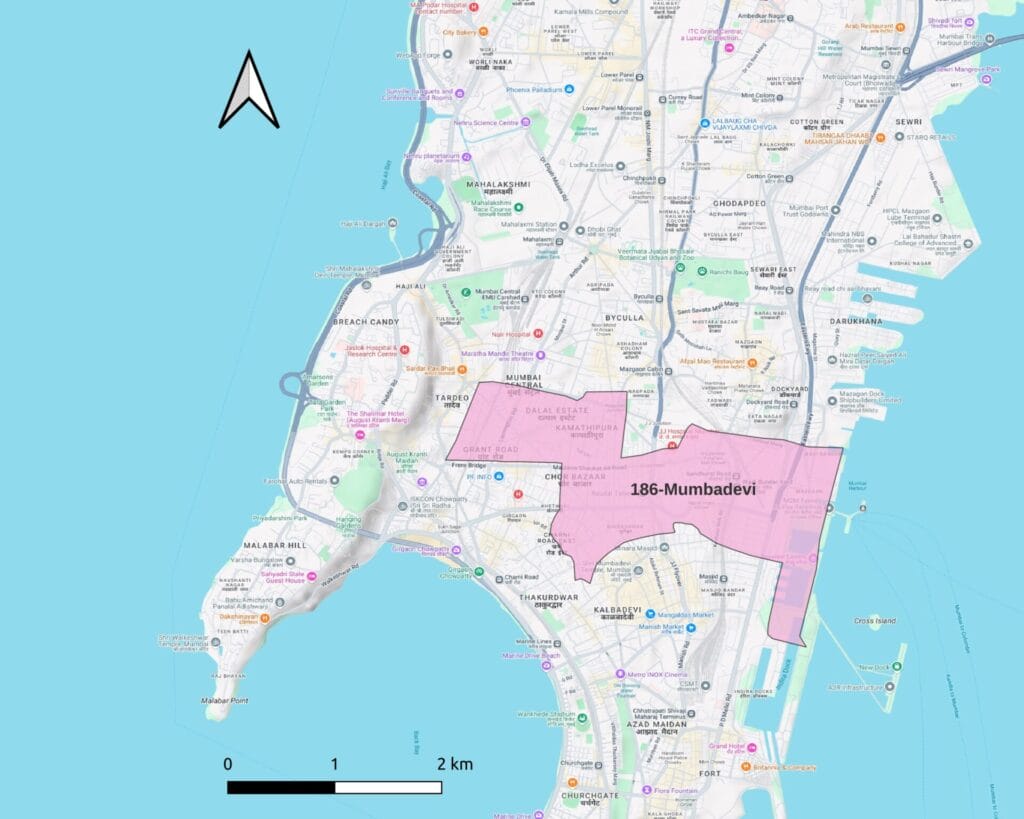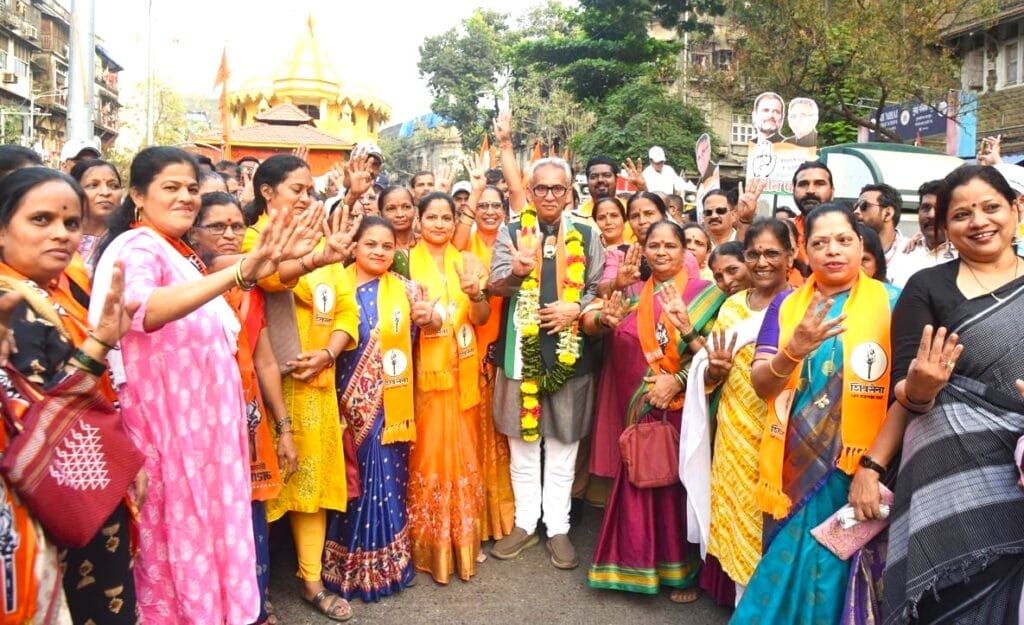Amin Patel is a top-ranked MLA, representing the Mumbadevi assembly constituency, according to the report card brought out by Praja Foundation, an NGO that works on civic issues. Mumbadevi is one of the oldest and most diverse areas of Mumbai, where the incumbent Patel (Indian National Congress) has served for three consecutive terms. The area comprises Grant Road, Girgaum, Dongri, Tardeo, Umarkhadi, Bhuleshwar and Nagpada.
Maharashtra is all set to vote on November 20th in the Assembly elections. The state has 288 assembly seats and of these 36 are in Mumbai. Though the number is small, Mumbai remains significant as the financial capital of the country and a metro that attracts lakhs of people for work.
Citizen Matters spoke at length to the three-time MLA and fourth-time contestant over a video conference. Amin Patel spoke about affordable housing, infrastructure and providing better education and health facilities for the people of his constituency.
Following is the edited version of the interview.
Congratulations on being number one MLA yet again. Could you tell us about your strengths and work practices that helped you become a top-ranked MLA?
I have been an MLA for the last 15 years, three times consecutively. But before that, I was also a member of the Brihanmumbai Municipal Corporation (BMC). That experience has helped me a lot because, in Mumbai, the corporation is very big. More than 50,000 voters are there for the corporation and all the basic amenities of Mumbai are managed by the BMC — be it education, roads, water, everything. So when I went to the Assembly for the first time, I was well aware of the problems of Mumbai. I had a good team on the ground. Also, I am always accessible to people at my office.
Since you mentioned the BMC, let me ask you about BMC elections. It’s been three years since they were postponed and we are still being governed by the administrator. What is your response to that?
I have always felt that elections should be held on time. It should not be delayed. A common man, a common citizen, has a clear idea. “There is no water in my house. I have to call the corporator. If there are potholes, they will call the corporator’s office. They have that habit in Mumbai to go to the politician and to get the work done. Very few people directly approach the corporation or go and meet the Assistant Commissioner or the concerned officer.

As of today, all four corporators in my constituency have offices and are doing the work. But they have a limited scope to work right now because they don’t have funds, and sometimes the BMC does not respond to the corporators, who are currently not elected.
Basically, people are being harassed. In Mumbai, a lot of things are getting affected because there are no corporators. All the load has come to me. I have to look into every small thing — be it a garbage pile-up or a water problem. Now, the MLA is the only source people turn to, hoping the issue will be sorted.
Has that changed the way you have worked in the past three years?
The time invested and effort taken have increased. We used to have helping hands earlier. All my corporators are working in the field. But, they have some issues. At least, 50% of the workload has increased.
Does it have an impact on the funds that are available to you?
Yes, big implications. The Central government also did some partiality. They gave funds to the ruling party. Actually, it was decided that money would be given to each MLA for the welfare of the constituency because the corporator was not there. But all the money went to the ruling party. Opposition MLAs are not able to get the funds. A lot of work has come to a standstill.
Can you give us a few instances?
For example, the repair of a sewer line, and repairs on quite a few water connections. We have to go at a very slow pace. We have to meet the Commissioner and talk to him. Tell him, “This fund is required.” Then go to the concerned minister and request him, “This is an important issue. Please sort it out.” A lot of problems are there to get the funds right now for the sitting opposition.
Read more: Walkability and affordable transit ignored as elections focus on big projects in Mumbai
In the past few years, Maharashtra has witnessed many political turmoils. Do you feel that the real issues are being neglected?
I believe that if anyone wants to switch parties, they should first resign and then join the new party. This is because people vote for a party, an ideology, and a candidate who belongs to that party. Although the Anti-Defection Law exists, I feel that, morally, one should resign before joining another party. This is the commitment we made to the people when we were elected.

One of the suggestions, when we spoke to civic groups was that the MLAs could use their funds to make areas around railway stations and metro stations more accessible and more easily walkable.
I’ve done a lot of beautification in my constituency. Apart from that I have two to three stations in my constituency. But the problem is that when you’re talking of a footpath or an accessible road, the city is so tight in those places. It’s easier to speak than to implement this tough job.
How do you intend to address the issues of infrastructure, public transport, health and so on?
Urban affordable housing is a big issue in Mumbai. There are approximately 16,000 dilapidated buildings in entire Mumbai. As you know, Mumbai was developed on six islands more than 150 years ago. Affordable housing can only come through a lot of cluster redevelopment. I am sure that you have heard about SBUT.
Cluster development is a good policy. After cluster development at Bhendi Bazaar, I took up a huge initiative in the Kamathipura redevelopment project. Initially, the policies were not in place but now it is underway.

We worked for over 10 years to reach this stage. Bringing 800 owners together was a significant task. Now the High Power Committee of the Government of Maharashtra has approved the project, and the tender will be called soon. This is indeed a very big project.
For future generations, we want to introduce the Future Generation Act, which includes infrastructure, education, health, and the environment. We have moved a Private Member Bill and, hopefully, if elected again, we will continue working on this bill. We must plan for 50 years down the line, not just for 5, 10, 15, or even 25 years.
Since you mentioned 50 years down the line, I can’t help but bring up climate change and the risk that Mumbai faces as a coastal city. The MCAP was initiated during Aaditya Thackeray’s tenure but we don’t know the progress now.
Climate change is a very big risk. With a few centimetres increase in water level, a large part of Mumbai’s reclaimed land is at risk. There should be a Commissioner for this; a Special Commissionerate like Portugal.
Politics must be kept aside. There should be a climate change and environment plan for Mumbai that is non-political, and created by good government officers and experts. Any incoming government should implement this plan properly. I see this as a risk to human life and the city, and it should not be taken lightly. We must work diligently, without politics, political lines, or political parties coming in between.
What are your promises for the people of your constituency?
The first one is affordable housing with cluster development and proper planning. The second is providing good, quality education. I am working on it. I have converted some schools into English medium schools, which are doing well. The third is to develop a state-of-the-art skill development centre — usually, when we talk of such a centre, people think of masonry, carpentry and electrical work. Not that. With new technology, maybe a centre that promotes robotic artificial intelligence. I plan to identify a place for that in the next five years.
Fourth, I will work on affordable healthcare. And lastly, we will be working on the Future Generation Act.
I don’t want to promise what I cannot deliver. These are the five things, which I’m working on and I will fulfil them at a faster pace if elected. My people are very good. They always support me. They always vote for me, so I’m confident of representing their voice once again and working for them in the Assembly. I’m very confident I will win this election.